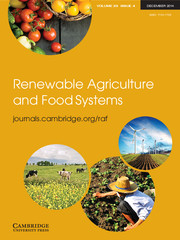Anyone who reads this review in this journal would enjoy reading this book. You already read a lot of writing on farming and alternative farming and the harsh things nature and civilization continually threaten farming with. And this book has those things in it. But the arrangements are fresh. There's pleasure taken in the composition and in its aphoristic triumphs: ‘It was summertime in New England, and the sheep were in the meadow. … A pesticide is a rigorous device for developing insects immune to it. … No one brings a plow to paradise.’
One reason for this is that the author does not pretend to read a lot in the professional and academic literature of alternative and family farming. He can title a chapter ‘Four Farms’, which discusses the clever practices of four different farms at various points on a spectrum from alternative to industrial, without any reference to Mark Kramer's classic study Three Farms. Jager is a retired professor of philosophy from Yale who wrote precisely and imaginatively in his own field. But he's retired to rural New Hampshire where he admires his rural, farming neighbors for their hard work and success and for their reminding him of his own rural upbringing. He wonders at considerable length about the process he's observed in his own lifetime of the ubiquitous farming of his youth becoming the rare family farming of the present. He reads enough in the literature about such questions that he finds useful. He has much more in the book that he draws from interviews with and observations of how his neighbors are actually doing.
The gist of the book, its most original idea at least to me, was that family farming in the sense of resolutely wholesome farming has almost always been subversive to the dominant economic paradigms of the day. Those paradigms demand eventual industrial productivity out of farms as out of factories or schools. But someplace in their evolution from subsistence, cottage or craft activities, farming and crafting and learning go through a necessary economic evolutionary period where the work is done well, at home, with natural materials, primarily for the benefit of those living nearby and making a living directly off the enterprise. It's a wonderful, ideal phase soon pushed aside for something more robust and abstract and amenable to social planning. The Roman latifundia or ‘big spreads’ drove out the yeomen farming beloved of Virgil and Cicero just as American factory farms drove out the yeomen family farming beloved of Crevecoueur and Wendell Berry. But never completely, since there are always enough farmers perverse and clever enough to figure out how to eddy against the current of the Big Flows. Clever farmers today offer organic produce and gently raised livestock to people alarmed about the miserable nutrition and even poisonous qualities of chemical farming and mass slaughterhouses. Some of these farmers actually get good enough at marketing to make serious money at the business, although never from following a formula. It's hard to teach subversive farming in regular academic curricula, which is mostly beholden to big industrial agribusiness interests anyway. ‘Resistance’ is Jager's conjuring word. These farms ‘are resisting soulless totalitarian tendencies’ a thousand different ways. Some begin in classic subsistence, alternative hippy farms, some in family farms that began by pioneering necessity on small land grants; some remain small, some become fairly large like, say, the cooperatives modernizing the production and distribution of ‘craft’ products like maple syrup. You can't plan for farms like these, or organize a culture's economics to encourage them, since planning and economic efficiency are always prejudiced for scale. But you can praise the praise of alternative agriculture to be found in classic Greek, Roman, European Romantic and early American Jeffersonian writings as Jager does. And you can write poems in its praise as does Wendell Berry, and preach its gospel with the fervent expertise of Wes Jackson, and keep the spirit alive. Jager wonders why Americans favor the term ‘farmers’ over the term ‘husbandmen’ the latter of which he thinks better suits the practice of good stewardship on the land. He does the etymological digging to discover the term ‘farmer’ came with a built-in connotation of farming for business. This makes even its use in the phrase ‘alternative farmer’ subversive down in the roots.
Given that it does have a gist, the book is more a sampler than a full course meal. Almost every chapter pursues its own line of thinking, from etymology to literary history to statistics to almost novelistic evocations of families sitting around cluttered tables on their farms figuring out their next clever thrust into the soft underbelly of Big Agribusiness. The one bit I did not like personally was Jager's harsh criticism of Henry David Thoreau's harsh assessment of the mostly subsistence farms he knew from his travels through Concord—where men trafficked in cattle hides to get the money they needed to buy leather shoelaces. Thoreau made fun of anyone who seemed silly from his tight self-containment. But that is just a sample of one thing I found too piquant for my taste. Here's a book for the readers of this journal for your stimulation and pleasure, even if you decide there is little in here to fold into your footnotes.


